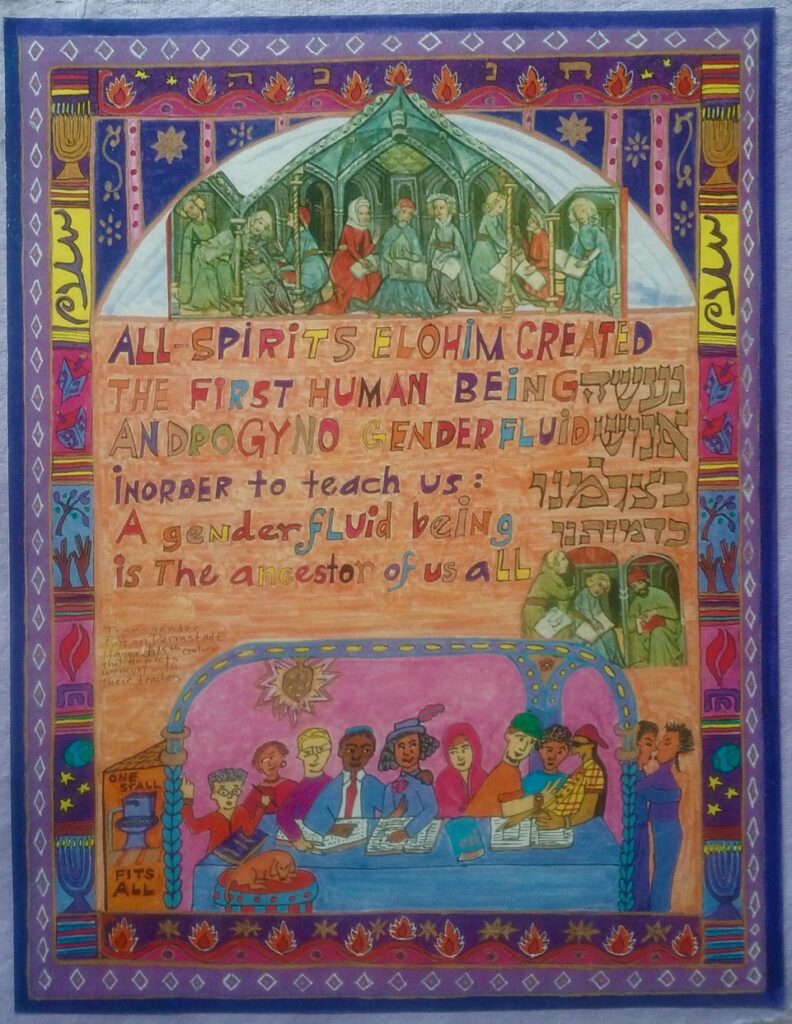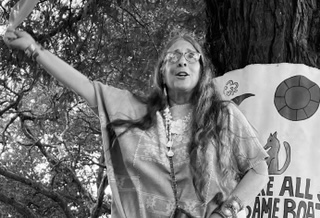Shekhinah is the name associated in traditional Judaism with the feminine, indwelling presence of God. Shekhinah, from my point of view, symbolizes the deep interconnectivity we feel to life if we only become still and observe the world around us and within us. However, those of us who become caretakers of life know that our values must be reflected in our actions, and our actions must be carried out in service of the wellness of all living beings. In light of the global crisis threatening our lives, we need to do our best to figure out which narratives, attitudes, beliefs and behaviors cultivate well-being, and which reinforce systems of persistent and terrible harm.
Sexism is one of those persistent and terrible harms that has been buttressed by Jewish theologies throughout our long history. While we can find Jewish narratives and histories that flip the script on sexism, nonetheless, sexual abuse, domestic violence, transphobia, rape and militarism persist in Jewish life (and the world), and I would argue, continue to be the norm. In spite of educational efforts, cases of sexual abuse and all the rest have actually spiked in the last decade while (1) the U.S. Reform and Conservative movements have recently initiated studies to determine the scope of sexual abuse in their congregations and organizations, (2) changing attitudes, beliefs and behaviors means a serious examination of our most sacred and cherished narratives as well, and how we use them. This cannot be accomplished without a commitment to teshuvah (returning to the path) for sexism, which includes guarantees of non-repeat of harms.
The fact that Shekhinah was important in kabbalistic and hasidic texts side steps a core liberatory principle we must employ if we are ever to prevent and eliminate the persistent harms of sexism: centering the diverse voices and experiences of transpeople as well as those directly and harmfully impacted by sexism — that is, women, in the process of creating meaningful repair. According to the protocols of teshuvah, we must set up systems of accountability which are led by those who have been and continue to be directly harmed by sexism. Otherwise, there are no guarantees that harm will cease, as is evident in contemporary cases of persistent and extensive sexual abuse, domestic violence, transphobia, the gender gap in material wealth, rape and the acceptance of militarism in Jewish contemporary life.
If we frame our narrative texts and theological ideas in the context of teshuvah for ongoing sexism, our first question is whether or not sacred narratives perpetuate harm or promote well-being, and how such discernment is carried out.
Teshuvah for the harms of sexism and its twin harm, racism, need to follow the stages of teshuvah: recognition of harm; truth telling by victims of harm; restitution and compensation for the harm; and finally, satisfaction by victims of harm along with guarantees of non-repeat. Teshuvah for sexism sets up a framework of accountability for the claims and assertions we make through our ceremonies, narratives and theology. Teshuvah is a Jewishly authentic practice to assess how our theologies are experienced in the lives of people who have suffered under the burden of sexism. We can’t expand on sexism’s narrative; rather, we need to transform our narratives based on how narratives impact queer, trans and female experiences of what we claim is sacred text.
Shekhinah understood within a theology of Divine Marriage is problematic. In order to dismantle sexism’s binary concepts about gender and gender roles, I believe Shekhinah, YHVH and Elohim need to be reimagined altogether in non-binary, gender-fluid or non-gendered ways.

When I think about Divine marriage these days, the first thing that pops into my mind are the fabulous queer couples who have chosen each other as life partners and create marriage ceremonies to celebrate. I began performing queer and trans marriages in 1976 when I was a baby rabbi. Each marriage ceremony was/is different and in alignment with the values and poetry of each couple. Marriages are a human affair that do not conform to one way of understanding what it means to choose love or be in partnership, aside from steadfastness and legal safeguards. Ceremonies increasingly reflect gender fluid, non-binary narratives and prayers because gender fluid and non-binary people have actively created them.
I believe that expressions of theology fall within the “meaning making” propensity associated with human beings and are not universally true. Rather, they are highly situational and emerge for many reasons. Barukh ata adonai may have had a revolutionary context to some Jews in the Roman period as a way of stating opposition to the claim of divine authority used by Roman emperors. King of the universe, however, does not work as a living pathway to experience a non-sexist Judaism for tens of thousands of Jewish people in the contemporary period because of the sexist social contexts in which Jewish theology was and is expressed.
Shekhinah was one tactic Jewish feminists used to up-end patriarchal expressions and open the door to a non-sexist vision of the world we want to see. To end sexism, we have to be a lot more honest and discerning about what we claim as truth and what authority we grant to people who claim truth. It’s one thing to be a researcher and a scholar on the topic of Shekhinah, and quite another to employ Shekhinah theology or any expression of theology in the human social sphere. To claim the Divine feminine as the earthy, immanent, compassionate, maternal and receptive side of the divine, while YHVH/Elohim is the heavenly, transcendent, discerning, fatherly and active side of the Divine draws upon patriarchal stereotypes of “the feminine” that have no basis in science and are incredibly destructive to queer people and womyn. This is not a version of Shekhinah that speaks to me any longer.
When I tell Jewish stories from sacred texts, I begin, “A long long long time ago, so long ago it might not have happened … ”
This is my strategy for an admission that Jewish sacred narratives and theologies are not set in stone, nor are they universally true. Rather, the truth of stories is whether or not they illuminate something true in our lives. In addition, for a liberatory practice, we are duty-bound to understand how our theologies and narratives have an impact on the lives of people who have been denied equity of power in Jewish gendered caste systems. If we recognize non-binary and fluid sets of meaning accompanied by a teshuvah framework for repairing harms, Shekhinah can become a liberatory narrative and spiritual practice framework to describe and help us shape the world we want to see.
What resonates for me in thinking about the meaning of Shekhinah? The biblical idea that when we build a mishkan (place where the Divine dwells) — that is, in structures of beloved community, Shekhinah dwells in our midst. Way of the Mishkan is my name for a practice that creates ceremonial and spiritual sanctuaries for people who suffer various forms of systemic violence including sexism, racism, ablism, transphobia and poverty. Shekhinah is my name for the presence of liberatory healing that safeguards against persistent harms. Shekhinah is my name for the well-being which arises when we practice accountable stewardship of all our relations. Shekhinah is my name for the mysterious, unknowable cosmos, as well as the miracle of being we experience when our hearts are fully open to each other and the earth, and all living things. Shekhinah is my name for the presence we feel when we wage a Torah of nonviolence in the face of systemic violence. Shekhinah is my name for the physical, emotional, mental and creative well-being that emerges when we disentangle ourselves from patriarchal systems and step into transformative, liberatory and life-giving resiliency, creativity and love. The result of my understanding of Shekhinah is a transformed narrative that focuses on non-gendered understandings of spiritual interconnectivity. This means a massive rewrite of Jewish sacred narrative, ceremony and social organization. The accompanying illuminated manuscript is an ode to Svara and gender queer learning, as well as to our ancestors who first envisioned the Divine’s creation of the first human as a gender fluid being.
NOTES:
- https://www.haaretz.com/israel-news/.premium-child-sexual-assault-reports-in-ultra-orthodox-cities-spike-in-the-last-decade-1.10441381
- https://religionnews.com/2021/10/15/as-reform-jews-investigate-themselves-a-reckoning-over-sexual-abuse-grows/








One Response
Hooray!! A women’s study group I am in are now studying the Shekhinah and I came across your article. THANK YOU thank you for publishing this view.